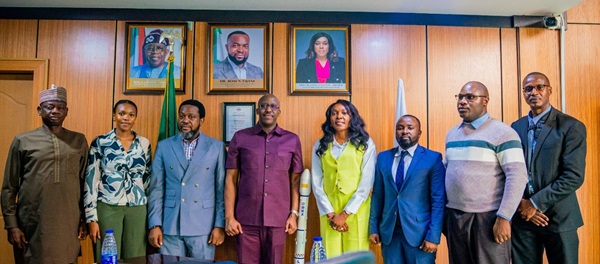The Nigerian Communications Satellite (NIGCOMSAT) Ltd and the Kenyan Space Agency (KSA) have initiated talks to strengthen cooperation in space technology, with a particular focus on leveraging services provided by NIGCOMSAT.
The discussions took place during a courtesy visit by the Director General of the Kenyan Space Agency, Brigadier (Rtd.) Hillary Kipkosgey, to NIGCOMSAT’s Ground Control facility in Abuja.
Both agencies highlighted the importance of collaboration in satellite services, national security, and policy development.
Brigadier Kipkosgey explained that the visit was aimed at understanding NIGCOMSAT’s offerings while exploring potential collaborations with Nigerian institutions.
“We are here to build a closer working relationship with our Nigerian counterparts.
“To achieve meaningful progress, we need deeper engagement and more frequent dialogue. One-on-one discussions like this are essential to forging productive partnerships and driving the continent’s space ambitions forward,” he said.
Nigeria highlights Africa’s leadership potential
The Managing Director of NIGCOMSAT Ltd, Mrs. Jane Nkechi Egerton-Idehen, commended KSA’s interest in collaboration, calling it a milestone for Africa’s space industry.
“Nigeria’s investment in the space sector was driven by visionary leadership that recognized the potential of space technology to grow our economy, build a robust ecosystem, and attract global investors.
I believe this collaboration can help address critical issues such as national security, sustainability, and sovereignty,” Mrs. Egerton-Idehen said.
Egerton-Idehen highlighted the need for African nations to actively shape the future of global space policy.
“From Morocco to Egypt, Kenya to South Africa, Nigeria and now Angola—Africa must claim its seat at the table. Not because it was handed to us, but because we have earned it through decades of dedication and leadership in this sector.”
She also reaffirmed Nigeria’s role in continental space leadership through its agencies, the Nigerian Space Research and Development Agency (NASRDA), NIGCOMSAT, and the Defence Space Agency (DSA).
“This next phase is pivotal. True progress will come when we move forward together,” she noted.
What you should know
NIGCOMSAT plans to generate N8 billion in revenue within the next three years by expanding its broadband services across Nigeria. Egerton-Idehen explained that while broadband is the company’s most profitable service, only 7% of its capacity is currently in use, leaving 93% idle.
She stressed that broadband has wide applications in education, defence, healthcare, fintech, and governance, but stronger collaboration with private sector partners is needed to unlock its full potential.
She highlighted that NIGCOMSAT had successfully demonstrated capacity by connecting 45 local government secretariats across eight states in just two months under Project 774—a feat that fibre operators could not achieve at the same speed.
The agency is projecting an average annual revenue of $3 billion as it repositions itself as a key driver of Nigeria’s digital economy. It has begun diversifying beyond broadcasting to enterprise connectivity, satellite broadband, and digital infrastructure, while also partnering with mobile network operators to extend 2G, 3G, and 4G services to underserved rural communities.












